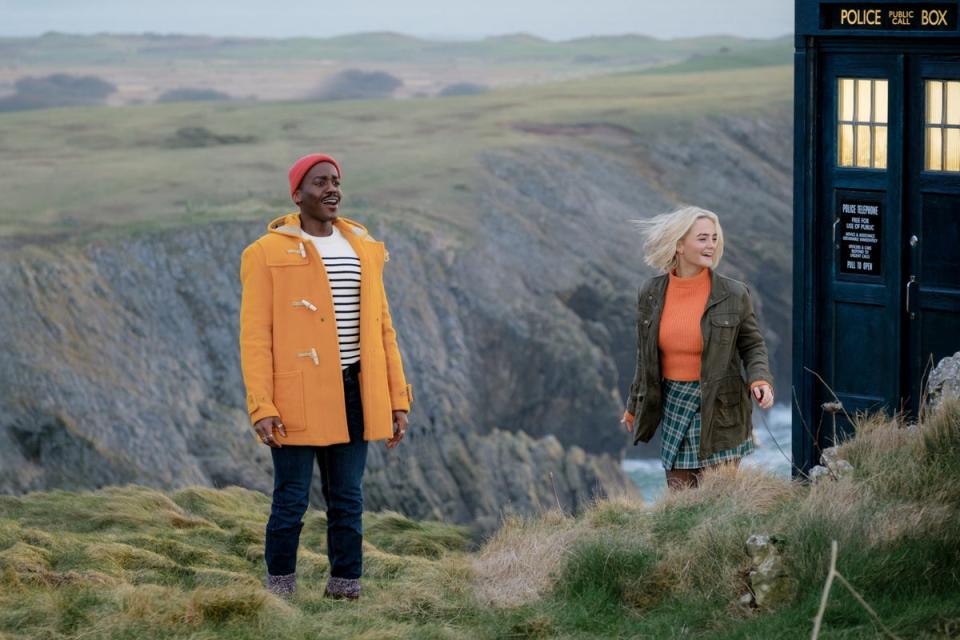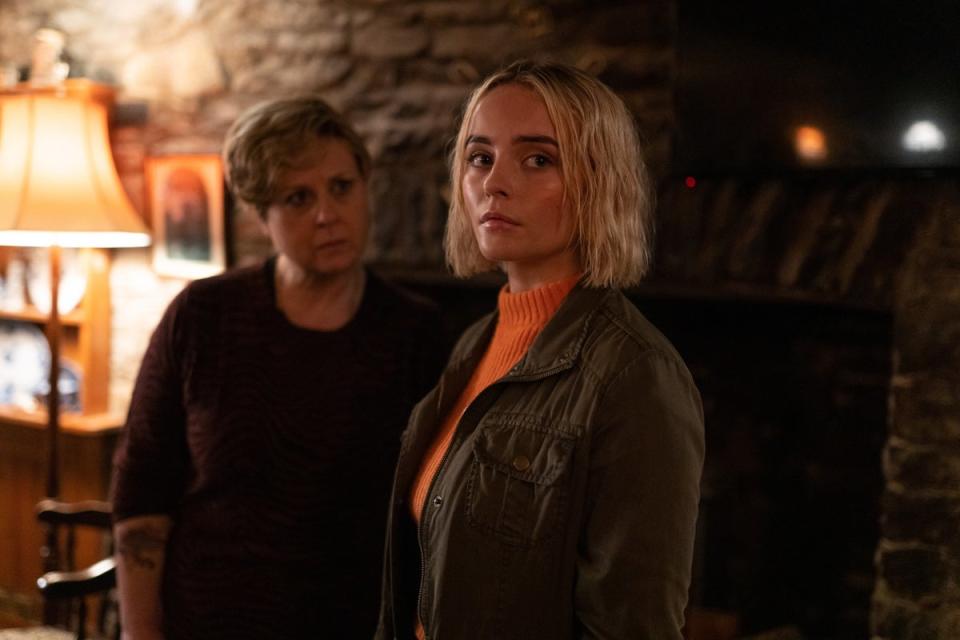Doctor Who: 73 Yards review – A five-star knockout all day long
Warning: this review is also a recap, meaning it contains spoilers for the episode
Finally, it’s here – the first Doctor Who classic of the Ncuti Gatwa era. Ironically, the 15th Doctor is absent throughout almost the entirety of “73 Yards”, but this is nonetheless an adventure made in his sincere, dashing image. It also passes the litmus test of any great Doctor Who instalment: would it work even without the Doctor? The answer is stonkingly in the affirmative.
The obvious influence on “73 Yards” is folk horror, and staples of the form such as The Wicker Man. It starts with the Doctor and assistant Ruby (the excellent Millie Gibson) materialising on a cliffside in Wales. While taking in the view, they blunder into a magic circle, opening an alternative timeline in which the Doctor disappears, and Ruby is left fend for herself.
But this showcase for Gibson’s Ruby quickly expands beyond the boundaries of any specific genre to become a sprawling tale of destiny, self-determination and learning to live and love your flaws and limitations. Oh, and there’s a scary woman doing weird hand signals and cackling just out of earshot. Could an ardent Whovian want for anything more?
What is especially telling is that, of the first four episodes in the latest season, “73 Yards” is both the best and by far the least Hollywood. The BBC’s deal with Disney has allowed it splash out on special effects and there have been moments when you could be watching a Marvel movie with better tailoring. But there are almost no whizz-bang adornments in “73 Yards”. We’ve rewound to the hallowed days when our heroes would tramp around a windswept and overcast real-world location – a back-to-basics vibe that adds to the wizardry.
Before the Doctor disappears, he has time to share a breadcrumb with Ruby – he mentions in passing a notorious Welshman from the future, Roger ap Gwilliam, “the most dangerous PM in history”. Only Ruby isn’t paying attention. She’s busy poking through the contents of the magic circle, where a note reads, “Rest in peace, Mad Jack.” What’s going on? No point asking the Doctor, who has just vanished.
But what’s this – a woman on the horizon (73 yards away, as we shall discover) is making hand gestures towards Ruby and saying… something? Heading for the local village, Ruby discovers the woman has become her shadow – following her constantly, but always staying distant and out of earshot. Ruby asks strangers to help, but they lose their wits whenever they approach the woman and peg it for the hills.
Showrunner Russell T Davies has fun with rural archetypes early in the instalment as Ruby rocks up at a pub and discovers the locals are not the superstitious yokels she takes them for (they include Siân Phillips as a woman named Enid). She eventually returns to London where her adoptive mum Carla (Michelle Greenidge) is driven mad by the woman. The penny drops: Ruby’s latest adventure through time and space is going to be a long-haul affair.

Robbed of her sanity, Carla abandons Ruby, changes the locks to her flat, and never again speaks to her daughter. Ruby sensibly makes contact with Kate Stewart (Jemma Redgrave) and her paranormal taskforce UNIT. Awkwardly, when they try to detain the woman, they all go bonkers, too.
Here is where the episode pivots into something special. In a montage soundtracked by Labi Siffre’s “Watch Me”, we see Ruby getting on with her life (the show signals that she is in her thirties by having her wear oversize glasses and glug wine from a huge glass).
It also becomes a fantastic showcase for Gibson, who has to go where few Doctor’s assistants have previously ventured by carrying the whole endeavour on her shoulders. She pulls it off impressively – to the point where you forget this is supposed to be the Doctor’s show, not hers.
She learns to accept that she and the woman are meant to be together: that she has no choice but make peace with fate. After a while, she even seems to grow fond of her eternal shadow. Davies shows his hand and reveals that the theme of “73 Yards” is learning to embrace the difficulties life throws at you and carry on regardless: it is a love letter to stoicism that delivers a real punch.
Then, another twist. As Ruby slogs ruefully onwards, Roger ap Gwilliam, the trigger-happy despot the Doctor warned her about, emerges as a Trumpian rising star of British politics. “I was a jack of all trades,” ap Gwilliam (Aneurin Barnard) says on the news. “Mad Jack, they used to call me.”
There it is! A connection between ap Gwilliam and the magic circle Ruby and the Doctor blundered into. Determined to stop this obvious war-monger, she poses as a supporter, signs up as a campaign volunteer and is by his side when he wins the election.
She learns that he plans to withdraw from Nato and unleash a wave of nukes – just for the fun of it. How do you stop a lunatic? By driving them mad, of course. At a rehearsal for ap Gwilliam’s big rally in a football stadium, she stands 73 yards from the aspiring dictator. Presto, the grey lady appears alongside ap Gwilliam. He is whipped into a frenzy by her whisperings and dashes off, all thoughts of nuclear oblivion forgotten.
Davies isn’t done, however. The rest of Ruby’s life plays out. We see her as an old lady on her deathbed. A shadow looms – the ghost-woman finally getting close. Then one last reveal. Ruby opens her eyes, and here she is – back in Wales, gazing down at her younger self and the Doctor.

So the old lady who has stalked Ruby is… Ruby herself. It’s a baffling twist worthy of Stanley Kubrick’s 2001: A Space Odyssey (which the death bed scene echoes, presumably on purpose). Is there any logic to it? Not really, no. But, at an emotional level, it is hugely impactful – so let’s let Davies off the hook for not fully laying out the how and why of it all. For him, it’s all about the vibes.
Back in the “present day”, young Ruby at last hears the message from her future incarnation: “Don’t step, don’t step.” She stops the Doctor from stomping upon the magic ring, the alternative timeline never happens and the duo return to the Tardis.
Does the ending entirely make sense? Possibly, though you’ll probably need a flowchart, a cork board and lots of string to work it out. It also feels weird for Davies to depict a patriotic Welsh person as an avatar for British nationalism. But never mind, “73 Yards” is a moving and provocative episode that has the gumption to put the fantastic new Doctor on the sidelines, even as it soars like the Tardis accelerating through a supernova. It’s a five-star knockout all day long.


